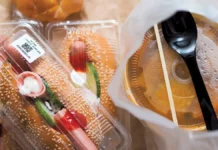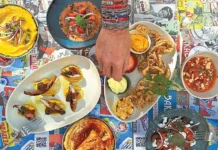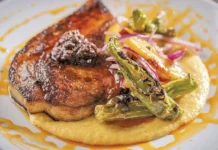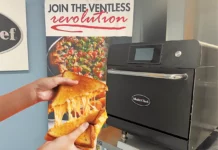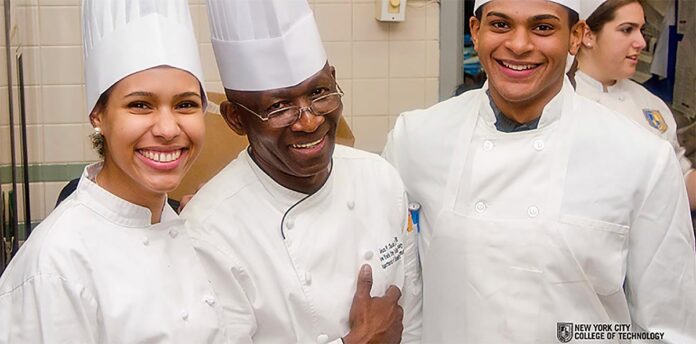
Success at City Tech: Q&A With Karen Goodlad

Karen Goodlad, CSW, is an Associate Professor at New York City College of Technology of the City University of New York where she was recently named the Interim Chair of the Department of Hospitality Management. Specializing in beverage management, she teaches an array of courses preparing students to become leaders in the hospitality industry.
As a proud and active member of Les Dames d’Escoffier New York she moderated the inaugural wine trends conference, The Next Big Sip. She was named by Total Food Service as a Top Woman in Metro New York Foodservice & Hospitality in 2019 and 2020. She is a Certified Specialist of Wine with the Society of Wine Educators. Her academic publications highlight her work as an hospitality educator and cover topics such as place-based learning, the first-year transition to college, and wine education.
Share your background prior to your role as an educator.
Prior to teaching I had several positions in the field of hospitality management an internship with the Walt Disney Company, worked in some independent restaurants, both FOH and BOH, and also worked at The Plaza Hotel.
What clicked where you knew you needed to give back through teaching?
People often told me that I would be a good teacher, so when an industry friend presented the opportunity to teach at City Tech, I was intrigued, I thought, yes, I can do that. Then my first day in the classroom sealed the deal. The students were eager to gain knowledge, eager to be part of something bigger than themselves. They gave me their energy and I returned it, creating many moments of deep learning both in lab situations and lectures. Those first moments with students in the classroom were 20 years ago, yikes!
What was the curriculum like in the past and now?
Liz Schiable is the outgoing chairperson. After 15 productive and creative years in the position, she recently retired. Under her leadership we created a course of study that was nimble enough to last for many years and focused enough to provide students with a specialty, should they want it. Students can earn an associate’s in applied science and a bachelor of technology with areas of focus that include food and beverage, culinary or pastry arts, tourism, and lodging operations. The BTech degree in Hospitality Management is an internationally accredited program of the Accreditation Commission for Programs in Hospitality Administration (ACPHA).
Our co-curricular activities, designed to provide additional chances for students to hone their professional skills, include The Anna Nurse Culinary Workshop, Spoons Across America, American Culinary Federation (ACF), Big Apple Junior Chapter, Aspiring Hoteliers Club, and the City Tech Tea Club, all include student leaders who invest in their own development for the betterment of the department as a whole.
Currently, the department members are at the beginning stages of a curriculum review. Though we constantly evaluate and shift our requirements, we are about to embark on a much bigger change. I look forward to leading this effort, one that will reflect the continually changing demands of the hospitality workforce and that will make more deliberate connections between the students and industry leaders. With our partners and advisory board, I believe we are in a good place to continue to serve the needs of the hospitality industry as we have for over 70 years, graduating students who can identify and demonstrate skills relevant to the operational areas of hospitality management while also exhibiting the analytical and social skills essential for success in the global workplace. As our current curriculum does, we will continue to utilize the dynamics of collaboration in diverse settings, we are after all, among the most diverse colleges of technology in the country.
How have the needs of the hospitality community evolved and intersected with your curriculum?
During the height of the pandemic, many of the inequities in the food and beverage industry played out in public settings, in our students’ communities, and in our student’s homes. We are the most diverse college of technology in the northeast, we celebrate that. We are also a Hispanic Serving Institution (HSI). Built into our curriculum are two elective courses that focus on ingredients and techniques of individual regional cuisines, but that also consider diversity and representation in the food industry. The courses are International Cuisine and International Desserts. The teachers take time to explore culture and celebrate the diversity of our student population and their lived experience, it is in this celebration of their diversity that we elevate them. Moving forward, we are seeking opportunities to explicitly collaborate with the HSI leaders on campus to forge college-wide conversations and actions similar to what we do in our courses.
How have you molded your program to respond to those changing needs?
Virtual everything is here to stay so it is important for us to prepare our graduates to work in this environment. Our future cooks, chefs, sommeliers, tourist professionals, and hoteliers will require the facilitation or participation in virtual meetings, conferences, and demonstrations.
Do you offer courses about plant-based cuisines?
We offer three courses The Art of Vegetation Cuisine, Sustainable Food Systems, and Nutrition for Food Service. In addition, the City Tech Garden Club covers this topic. In the past, we farmed a plot at Brooklyn Grange and now we have a hydroponic garden that often provides lettuces and herbs for our culinary labs.
As you look at your students today, how important is the classroom piece?
In-person learning will benefit students in terms of applied skills like, filleting a fish, piping rosettes, analyzing wine and more. But in-person learning does a lot more in terms of student retention and persistence, the quick help that a professor can provide when a student says “I have a quick question”, I call this “drive-thru advising”. Sometimes the answer is truly quick, other times the question reveals the need for a deeper conversation and the faculty member can invite students into that longer conversation. Then there is “spillover advising”, which is when students support each other. Something like “hey, I just spoke to Professor Goodlad about the same issue, here is what she said…”. This just does not happen often enough in a virtual classroom setting.
What do you suggest that the industry does to help facilitate the career path for entry level personnel?
More structured internship programs that provide a rotation through various positions offering developmental and leadership opportunities for recent graduates and include insight into all aspects of the workplace. A sommelier will be better prepared to pair food if they have examined the menu and spent time in the kitchen. A line cook can better prepare to be a sous chef if they spend time in purchasing. We graduate students who have a technical degree that is grounded in the liberal arts, exposing them to the basics and celebrating them as they practice and improve and create. In the workplace, they make contributions based on their classroom experience but they need to be provided with a path to show their knowledge and skills and express their values as they continue to learn.
What support does City Tech get from the Hospitality and Food Service Industry?
The cost of college is often cited as the most significant reason students stop attending. Additional reasons are linked to feeling connected with the college experience and their course of study. Organizations like Les Dames d’Escoffier NY (LDNY), The Partridge Foundation, The Food and Beverage Association and NYC & Company offer financial scholarships and networking to students. These scholarship programs are intentionally designed to address both the financial and connection issues and more. The LDNY formal mentoring program along with the financial award has an exponential effect.
Societe Culinaire Philanthropique and Paris Gourmet offer different approaches but address these same retention concerns. These organizations fund our study abroad program in Paris which heightens students’ exposure to new cultures and deepens the impact of their
education.
Our donors recognize that their generosity impacts the award recipient’s preparedness for the industry and creates additional reasons to stay in school and work towards their academic and career goals.
Find Karen Goodlad on Instagram & Twitter @ProfGoodvino, FB & LinkedIn – Karen Goodlad, Website: Prof. Karen Goodlad


















